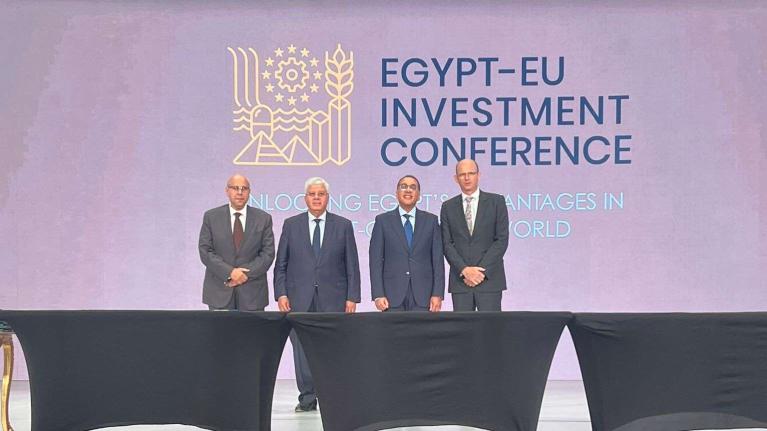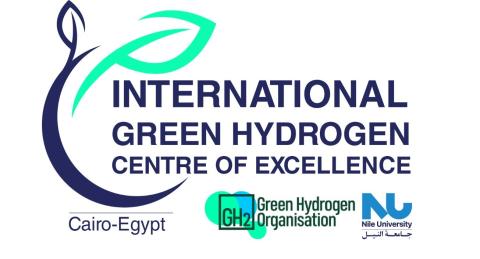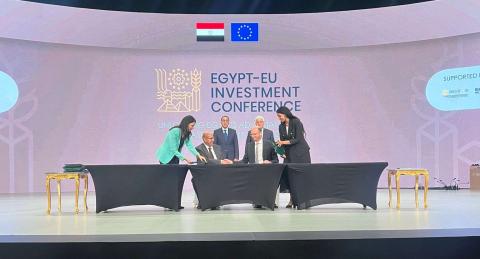Egypt is serious about green hydrogen

An impressive set of green hydrogen deals were signed in Cairo over the weekend during the Egypt-EU Investment Conference where European Commission President Ursula von der Leyen spoke of Egypt’s massive potential as a clean energy hub: “Such a clean energy hub would put Egypt at the centre of the Mediterranean crossroads, with new corridors to transport clean electricity and hydrogen, but also creating new clean-tech value chains that span across our region, from the Gulf to Europe.” This point was also made by Egypt’s President El-Sisi who noted the importance of Egypt as a “hub for the transfer and trade of renewable and green energy.”
Among the most notable deals signed were a consortium made up of France’s EDF Renewables and the Egyptian-Emirati company Zero Waste signing a cooperation agreement for its Ras Shukeir project on the western shore of the Gulf of Suez totaling EUR 7 billion across three phases, with EUR 2 billion allocated to produce 1 million tons of green ammonia annually in a first phase; Belgian company DEME’s agreement to establish a production facility in Egypt’s western desert initially expected to produce 320,000 tonnes of green ammonia annually; and a green ammonia Heads of Terms offtake agreement between Yara Clean Ammonia and a production consortium made up of Norway’s Scatec, the Egyptian Petrochemicals Holding Company (ECHEM) and Misr Fertilizers Production Company (MOPCO) with targeted production capacity of up to 150,000 tonnes of renewable ammonia annually backed up by a Letter of Intent from the European Investment Bank to provide long-term financing for the project.
Egypt has now signed 32 memoranda of understanding for green hydrogen projects worth around USD 175 billion. Around half of these have progressed to framework agreements, including Voltalia and TAQA Arabia’s project near Ain Sokhna port in the Suez Canal Economic Zone signed at the conference, and a consortium now led by bp also comprising Masdar, Hassan Allam Utilities and Infinity Power also inked at the conference. A small number have even begun initial operations, with Fertiglobe’s shipment of a consignment of green ammonia from its Egypt Green pilot facility near the Suez Canal to Unilever in India last year as a milestone moment.
Egypt really is serious about green hydrogen, and for good reason. The country has excellent renewable energy potential and has invested heavily in its electricity infrastructure and transmission network under the leadership of Egypt’s Minister of Electricity and Renewable Energy Dr. Mohamed Shaker.
With a population of over 110 million, Egypt already uses a lot of grey hydrogen domestically in its large fertiliser and petrochemical sectors which should be replaced with green hydrogen and ammonia. As Africa’s largest steelmaker it also has great potential to move to green steel production using green hydrogen.
Egypt of course also has enormous export potential given its location. It is a gateway to Europe, sits between Africa and the Middle East, and between the Mediterranean and the Indo-Pacific region. Many of the projects in Egypt are being designed with export to Europe in mind since the EU will rely on imports to meet its green hydrogen consumption needs in key industrial demand centres like Germany.
The keen interest in green hydrogen in Egypt is therefore no surprise. However, ensuring a flourishing green hydrogen sector to address climate change, improve energy security and socioeconomic development in the country is not without challenges. Egypt is well aware of the global competition for green hydrogen investment with many countries jockeying for a prime position in the sector.
With high debt, growing inflation and a weak currency, Egypt’s ability to finance large infrastructure projects on its own is limited. Indeed public expenditure has been capped at 1 trillion Egyptian pounds (USD 20.7 billion) for this fiscal year.
Egypt has therefore opted for a number of fiscal incentives to attract investment in the green hydrogen sector. These include tax credits of 33-55% on green hydrogen production and VAT exemptions for equipment. To speed up the administrative processes, the government has also implemented a “Golden Licence” regime where a single approval is issued by the Cabinet on establishing, operating and managing a green hydrogen project.
In return for these incentives, project developers also need to satisfy a number of conditions including on local employment and local manufacturing. A maximum of 30% of the workforce can be non-Egyptian and developers must secure 70% of the investment cost of a project from outside of Egypt and start operations within five years of concluding agreements. They also have to commit to using locally-made components whenever they are available domestically, while meeting a minimum 20% local-content requirement.
Minister Shaker told the conference that Egypt was planning to raise its target for renewable energy generation to 58% by 2040. Currently most of the country’s power is generated from natural gas with renewables accounting for 12% of the total. Gas shortages in the country have led to frequent power cuts in the country so a move to a larger share of renewables is sorely needed for consistent supply and for green hydrogen. However, even more investment needs to go into connecting renewables to the grid. There is also the issue of ensuring Egypt has a robust Renewable Energy Certification (REC) regime so that the country’s green hydrogen can satisfy conditions in export markets such as the need for additionality, geographic and hourly time matching in the European Union. While in Cairo over the weekend Jonas and I assured Minister Shaker and Planning Minister Hala Elsaid that we would support their efforts and the new Cabinet led by Prime Minister Mostafa Madbouly on this issue.
Given the impressive pipeline of green hydrogen projects in Egypt, the new government announced today should keep trying to get the balance right between attracting sorely needed investment to get these projects to final investment decision faster and ensuring the country benefits socially and economically from green hydrogen. Every country with excellent renewable energy and green hydrogen production potential has its own specificities and all are trying to find the right balance.
There is so much that low and middle income countries can learn from each other and to share experiences at this early stage of the sector’s development. The role of multilateral development banks will also be key to the success of the green hydrogen sector in these countries, and it was good to see the European Investment Bank announce a Green Sustainable Industry financing initiative at the conference which will assist Egypt in its transition to a low carbon economy.
Inspired by Egypt’s progress in developing its green hydrogen sector, together with our friends at Nile University we were also delighted to launch the GH2 International Green Hydrogen Centre of Excellence (the “GH2 Cairo Centre”) at the conference to provide global leadership and build the talent needed to deploy sustainable large scale green hydrogen projects particularly in developing and emerging economies.

We are truly excited about the potential of the GH2 Cairo Centre which will facilitate regional collaboration through the Africa Green Hydrogen Alliance (AGHA) that brings together ten African governments with ambitious green hydrogen plans. An initial activity taking place next month is the Green Hydrogen Policy Accelerator Training course jointly organised with the International Solar Alliance under its Green Hydrogen Innovation Centre platform, underscoring the GH2 Cairo Centre’s commitment to education and stakeholder engagement.
The Centre will leverage partnerships with government, companies, financial institutions, civil society, research institutions, and think tanks, as well as GH2 members and partners, to support its growth and mission. Please do get in touch if you would like to know more!

“The government welcomes the establishment of the International Green Hydrogen Centre of Excellence, the GH2 Cairo Centre. The rapid expansion of renewable energy including green hydrogen requires collaboration on policy, skills and finance. Bringing local economic development will be at the heart of the Centre’s activities.”
H.E Mohamed Shaker, Egypt’s Minister of Electricity and Renewable Energy
“The GH2 International Green Hydrogen Centre of Excellence in Cairo can be the spider in the knowledge web, connecting experts, policymakers, industry leaders and financial institutions globally to advance the critical need to deploy green hydrogen and provide affordable, efficient and sustainable energy solutions.”
Dr. Mahmoud Mohieldin, United Nations Special Envoy on Financing the 2030 Sustainable Development Agenda and UN Climate Change High-Level Champion for Egypt
“This new partnership between GH2 and Nile University to launch the International Green Hydrogen Centre of Excellence in Cairo is extremely welcome news. The GH2 Cairo Centre will ensure that the skills and strategies are there for green hydrogen to flourish as part of a just transition in Egypt and the wider region.”
Sharan Burrow, GH2 Interim Chair and former general secretary of the International Trade Union Confederation
“I am delighted that the Green Hydrogen Organisation and Nile University are creating this knowledge hub in Cairo. The GH2 Cairo Centre will position Egypt at the forefront of the global green hydrogen economy, fostering innovation and international cooperation to assist the deployment of sustainable large scale green hydrogen projects particularly in developing and emerging economies.”
Dr. Andrew Forrest, Executive Chairman, Fortescue
“The establishment of GH2 International Green Hydrogen Centre of Excellence at Nile University is not only a testament to our commitment to innovation and sustainable development but also a strategic step towards positioning Nile University as a hub for cutting-edge research in renewable energy solutions. Together, we aim to make significant strides towards a greener future building on GH2 expertise and Nile University’s research-base capacity and its national and regional outreach and impact in sustainable development arena, while integrating green hydrogen as an emerging and critical component in the research and development portfolio in Africa and the region.”
Dr. Wael Akl, President, Nile University
“Today’s launch of the GH2 International Green Hydrogen Centre of Excellence in Cairo is a major milestone towards achieving the renewable energy and green hydrogen ambitions of Egypt, the African continent and beyond.”
Jonas Moberg, CEO, Green Hydrogen Organisation